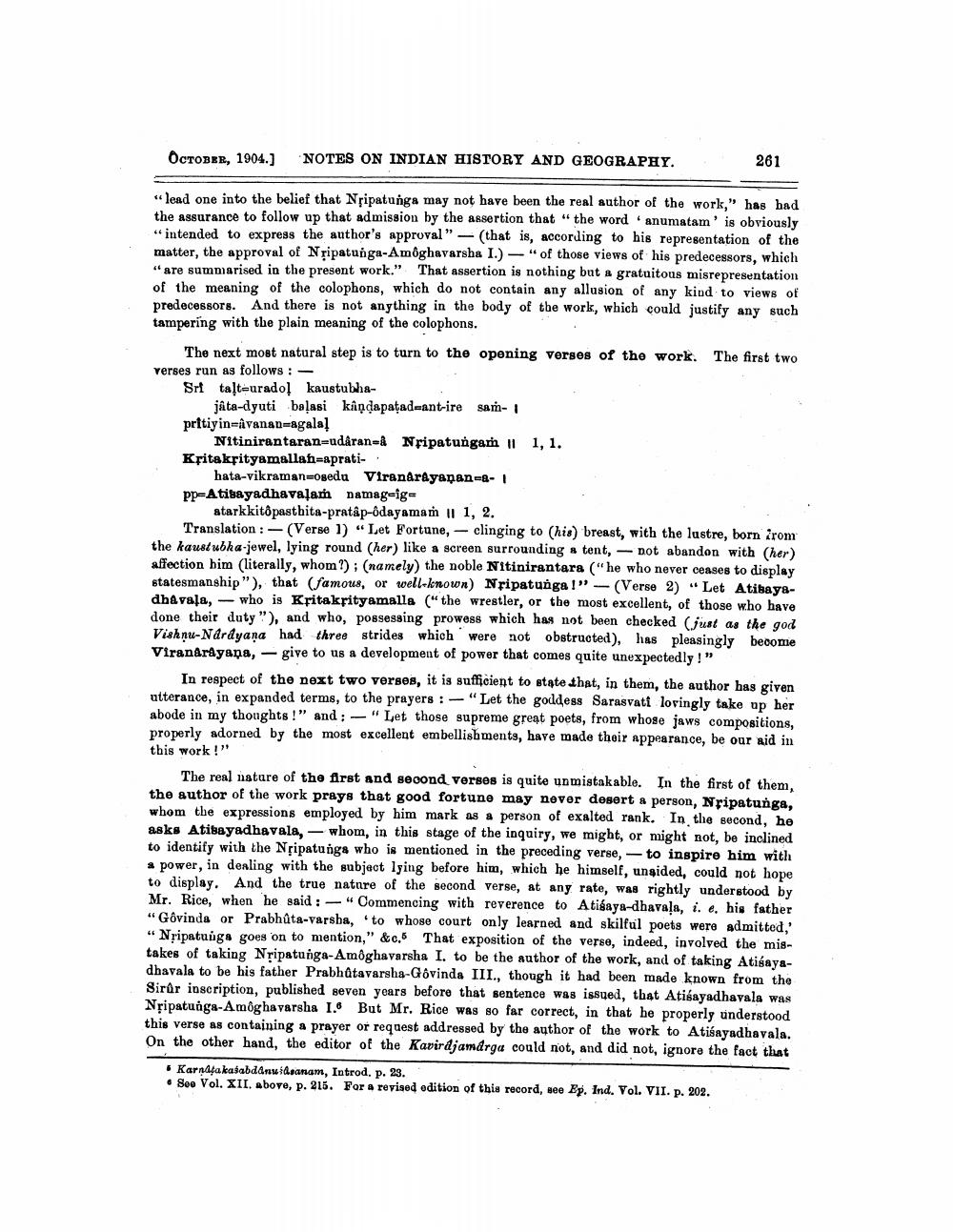________________
OCTOBER, 1904.]
NOTES ON INDIAN HISTORY AND GEOGRAPHY.
lead one into the belief that Nripatunga may not have been the real author of the work," has had the assurance to follow up that admission by the assertion that "the word anumatam' is obviously "intended to express the author's approval" (that is, according to his representation of the matter, the approval of Nripatunga-Amôghavarsha I.) "of those views of his predecessors, which "are summarised in the present work." That assertion is nothing but a gratuitous misrepresentation of the meaning of the colophons, which do not contain any allusion of any kind to views of predecessors. And there is not anything in the body of the work, which could justify any such tampering with the plain meaning of the colophons.
The next most natural step is to turn to the opening verses of the work. The first two verses run as follows:
Sri talt uradoļ kaustubha
jâta-dyuti balasi kândapaṭad-ant-ire sam
Nitinirantaran-udâran-â Nripatungaṁ 1, 1.
Kritakrityamallah-aprati
hata-vikraman=osedu Viranarayanan-a- | pp-Atisayadhavalam namag-ig=
pritiyin-ivanan-agala]
261
atarkkitôpasthita-pratâp-ôdayamam II 1, 2.
Translation: (Verse 1) "Let Fortune, clinging to (his) breast, with the lustre, born rom the kaustubha-jewel, lying round (her) like a screen surrounding a tent, not abandon with (her) affection him (literally, whom?); (namely) the noble Nitinirantara ("he who never ceases to display statesmanship"), that (famous, or well-known) Nripatunga!" (Verse 2) "Let Atibayadhavala, who is Kritakrityamalla ("the wrestler, or the most excellent, of those who have done their duty"), and who, possessing prowess which has not been checked (just as the god Vishnu-Narayana had three strides which were not obstructed), has pleasingly become Viranarayana, give to us a development of power that comes quite unexpectedly!"
-
In respect of the next two verses, it is sufficient to state that, in them, the author has given utterance, in expanded terms, to the prayers: "Let the goddess Sarasvati lovingly take up her abode in my thoughts!" and: "Let those supreme great poets, from whose jaws compositions, properly adorned by the most excellent embellishments, have made their appearance, be our aid in this work!"
The real nature of the first and second verses is quite unmistakable. In the first of them, the author of the work prays that good fortune may never desert a person, Nripatunga, whom the expressions employed by him mark as a person of exalted rank. In the second, he asks Atisayadhavala, whom, in this stage of the inquiry, we might, or might not, be inclined to identify with the Nripatungs who is mentioned in the preceding verse, to inspire him with a power, in dealing with the subject lying before him, which he himself, unaided, could not hope to display. And the true nature of the second verse, at any rate, was rightly understood by Mr. Rice, when he said: "Commencing with reverence to Atisaya-dhavala, i. e. his father "Govinda or Prabhûta-varsha, to whose court only learned and skilful poets were admitted,' "Nripatunga goes on to mention," &c. That exposition of the verse, indeed, involved the mistakes of taking Nripatunga-Amôghavarsha I. to be the author of the work, and of taking Atisayadhavala to be his father Prabhutavarsha-Govinda III., though it had been made known from the Sirar inscription, published seven years before that sentence was issued, that Atisayadhavala was Nripatunga-Amôghavarsha 1.6 But Mr. Rice was so far correct, in that he properly understood this verse as containing a prayer or request addressed by the author of the work to Atisayadhavala. On the other hand, the editor of the Kavirajamarga could not, and did not, ignore the fact that
Karnatakasabdânuiasanam, Introd. p. 23.
See Vol. XII. above, p. 215. For a revised edition of this record, see Ep. Ind. Vol. VII. p. 202.




